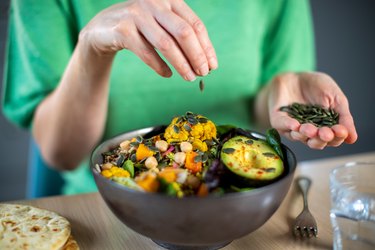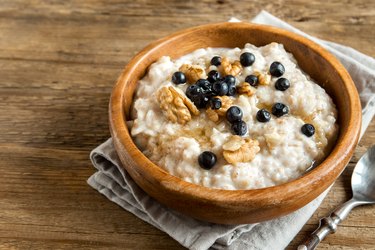
Anyone who's had the unfortunate experience of a hiatal hernia knows that it can sometimes make mealtimes miserable.
Some symptoms of the condition — which occurs when a small part of your stomach slides up into your chest through a weak spot in your diaphragm, per the Cleveland Clinic — can be eased by certain foods and exacerbated by others.
Video of the Day
Video of the Day
Here, we discuss the types of foods that can help — and hurt — a hiatal hernia.
Symptoms of Hiatal Hernia
A hiatal hernia doesn’t always have symptoms, but when it does, they're similar to the symptoms of gastroesophageal reflux disease (GERD). According to the Cleveland Clinic, these can include:
- Chest pain
- Heartburn
- Bitter or sour taste in the back of the throat
- Bloating and belching
- Discomfort or pain in the stomach or esophagus
The Best Foods to Eat With a Hiatal Hernia

To manage a hiatal hernia, it's important to maintain a healthy weight, stop smoking, eat small meals at least three hours to four hours before laying down and avoid fatty and acidic foods, per the Cleveland Clinic.
Most of the clinical research on hiatal hernia and diet is associated with the foods that have been found to help hamper symptoms of GERD, per the Canadian Society of Intestinal Research.
1. Lean Protein
If you have a hiatal hernia, focus on lean meats instead of fatty ones. Meats with high-fat content, including red meat and cold cuts, can aggravate the condition, per the Mayo Clinic.
Choose lean protein sources, such as skinless chicken breasts, mackerel and cod. If you like hamburgers and meatloaf, you might substitute ground turkey for ground beef. Nonmeat sources of protein, including beans and tofu, are also a smart pick.
Bake your meats and fish instead of frying them, and avoid extremely spicy seasonings and marinades.
2. Vegetables
Vegetables are a great choice for side dishes and snacks, as most won't aggravate a hiatal hernia, and they can be beneficial for acid reflux because they are high in fiber.
Dark leafy greens, such as broccoli and spinach, provide plenty of calcium and vitamin B, while red bell peppers and carrots are great sources of antioxidants.
Other vegetables you can enjoy include kale, sweet potatoes, squash and string beans.
3. Low-Acid Fruit
Low-acid fruits offer health benefits without aggravating heartburn. Some healthy picks include:
- Apricots
- Cherries
- Raspberries
- Blueberries
- Cantaloupe
4. Whole Grains
Complex carbs and whole grains like oatmeal, whole-grain bread, couscous and rice are good choices for those with gastrointestinal issues, per the International Foundation for Gastrointestinal Disorders (IFFGD).
Potatoes and other root vegetables are also smart starchy picks, but be sure to avoid adding common flavors like onion and garlic, because these are common irritants, per the IFFGD.
5. Healthy Fats
While certain fatty foods can exacerbate symptoms of a hiatal hernia, eating both monosaturated and polyunsaturated fats in moderation will benefit your health without rubbing your esophagus the wrong way, so to speak.
According to the IFFGD, some sources of these healthier fats include:
- Olive, sesame, sunflower and canola oils
- Avocados
- Nuts and nut butters
- Tofu
- Salmon and trout
6. Watery Food
Eating foods that contain a lot of water can help dilute and weaken stomach acids, per Johns Hopkins Medicine. Examples of water-rich foods include:
- Celery
- Cucumbers
- Lettuce
- Watermelon
- Broth-based soups
- Herbal tea
Foods to Avoid With a Hiatal Hernia

Many people with a hiatal hernia have no symptoms, in which case, changes in diet are not necessary, according to the Cleveland Clinic.
For those who do have symptoms, treatment may include dietary changes aimed at avoiding foods that tend to trigger GERD.
1. Fatty Foods
There are several foods that increase the amount of acid produced in your stomach, which will in turn produce more reflux. Avoiding these foods will help manage the GERD-like symptoms of hiatal hernia.
Substitute fatty and fried foods with baked or grilled items, which can help decrease the likelihood of reflux, according to the IFFGD.
Full-fat dairy products can also be triggers for reflux, so look to their lower-fat counterparts when you're experiencing symptoms.
2. Garlic, Onions and Spicy Foods
Not everyone has trouble with garlic and onions, per Fisher Titus Medical Center, but they are commonly found to incite GERD symptoms, so it's worth phasing them out to see if doing so makes a difference for your hiatal hernia symptoms.
Spicy foods, including jalapeno peppers, foods prepared with black pepper and any food that exerts a "heat" sensation can irritate the lining of the esophagus, which can make symptoms worse. Even if you love the heat, you should especially cut back when you're dealing with symptoms.
3. Highly Acidic Foods
The acid in some fruit and juices is also considered an esophagus irritant. Foods like tomatoes (and tomato sauce) and orange juice are common culprits, as is pizza, which is both acidic and fatty.
4. Coffee
Coffee has been shown to reduce the tone of the lower esophageal sphincter, which opens the doors for stomach acids to enter, per Fisher Titus Medical Center. Chocolate and mint may also have this effect.
Coffee — its caffeine content in particular — also stimulates acid secretion. If you can't live without your morning cup, try to find a low-acid offering.
Related Reading
5. Alcohol and Carbonated Beverages
Water may be your best bet for drinking with hiatal hernia symptoms. Alcoholic beverages are known to contribute to GERD symptoms, per Fisher Titus Medical Center, but affect everyone differently. The medical center recommends limiting your boozy beverage count to one, and cutting yourself off at least two hours before bed.
Bubbly sippers can cause bloat and distention — even the nonalcoholic kind — and this puts extra strain on the lower esophageal sphincter.
- Cleveland Clinic: Hiatal Hernia
- Canadian Society of Intestinal Research: "Diet and Gastroesophageal Reflux Disease"
- Mayo Clinic: "Hiatal Hernia"
- International Foundation for Gastrointestinal Disorders (IFFGD): "Diet changes for GERD"
- Johns Hopkins Medicine: "GERD Diet: Foods That Help with Acid Reflux (Heartburn)"
- Fisher Titus Medical Center: "Foods to Avoid With GERD"
Is this an emergency? If you are experiencing serious medical symptoms, please see the National Library of Medicine’s list of signs you need emergency medical attention or call 911.